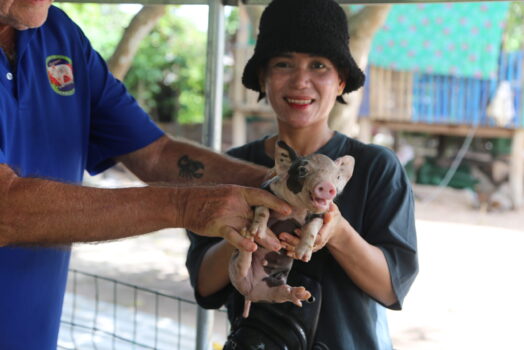
Piglets for Cambodians (P4C) provides rural families with a female pig. They must care for the pig so that when it has a litter of piglets, they get to keep the litter and the parent. This program helps families who are struggling to get by to generate a sustainable livelihood and take steps toward lifting themselves out of poverty.
What do they do?
Why piglets? Piglets are a small investment with a big return.
Each piglet creates an income stream through breeding, market sales, and home consumption. Families don’t just receive an animal — they receive a future. A gifted sow becomes a long-term asset that helps a family by:
-
Providing them with US$1000+ in annual income
-
Improves nutrition and food security
-
Keep children in school and learning, instead of leaving to support family income
-
Helps families achieve true self-determination
Each family gifts one piglet from every litter back to the program, creating a cycle that keeps growing. They call it “Pigenomics”. They vaccinate all pigs, limit overcrowding, ensure responsible breeding practices and provide on-call veterinary support. They also supply biodegradable bags and partner with communities to ensure clean and responsible waste disposal.
The program itself is also a sustainable cycle, whereby pig waste fertilises local banana crops, which in turn are milled for nutritious pig feed, which supports the breeding of another healthy litter – and so on.
How can you help?
Any contribution will be welcomed. It takes only US$60 (AU$100) to gift a female piglet to a family.
-
Make a one-off or recurring donation
-
Share this campaign on social media
-
Tell a friend who might like to help
-
Host a fundraising activity or donation jar
-
Share this with your members
-
Contact us to discuss opportunities to provide us with support and help to get our message out there.
EXO Foundation support
In October 2025, EXO Foundation made a donation to Piglets for Cambodians to support their work in empowering rural families and to make long-term impact by:
- Creating income generation from the sale of piglets and pork.
- Establishing a breeding cycle that provides ongoing returns.
- Encouraging community ownership through the pass-on model.
- Reducing reliance on aid by equipping families with skills, assets, and independence.